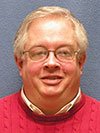Faith and Family / Sean Gallagher
Religious liberty is formed in the family
 We’re now in the middle of the “Fortnight for Freedom”—a time in which our bishops have invited us to learn about religious liberty, to hear homilies about it at Masses and to pray for its preservation.
We’re now in the middle of the “Fortnight for Freedom”—a time in which our bishops have invited us to learn about religious liberty, to hear homilies about it at Masses and to pray for its preservation.
Religious liberty has been a topic of discussion for months now for our bishops as well as leaders in Catholic universities, hospitals, charitable agencies and even Catholic business owners.
That’s because the federal Health and Human Services Administration is seeking to require nearly all employers to provide abortion-inducing drugs, elective sterilizations and contraception at no charge to their employees even if they are at conscience opposed to these medicines and procedures.
Religious liberty should also be a topic of discussion around our dinner tables. This God-given right is as important to families as it is to dioceses, Church-run schools and business owners.
Parents instinctively want to help their children prosper, and become the men and women that God created them to be. An essential part of each person’s nature is religious liberty. Without this first freedom, we cannot truly embrace the vocation given to us by God.
Now this might sound abstract, especially given the fact that, for so long, religious liberty has been lived as a normal part of life by Catholics in the U.S.
It’s been that way for me my whole life. I was born in 1970, 10 years after John F. Kennedy became the first Catholic elected president. That historic event was a sign that Catholics had become fully accepted and incorporated into American society.
Nevertheless, when I was growing up, I heard stories from my Catholic grandfather, who was born in 1906 and came of age in the 1920s when the Ku Klux Klan with its strongly anti-Catholic tendencies held sway in Indiana.
He told me the story of a Klan cross burning in a field across the road from his family’s farm in Johnson County, and how he would stand up to “Ku Kluxers” in high school.
I also heard stories about the 1924 burning of St. Vincent de Paul Church just outside my hometown of Shelbyville. At the time, it was determined to have been an arson fire. No one was ever officially charged with the crime, but it was popularly believed, even when I was growing up 50 years later, that members of the Klan were responsible.
I did not have to face such blatant challenges to my religious liberty like my grandfather and the Catholics of Shelby County did in the 1920s.
But hearing those stories as a boy, especially from my grandfather, impressed on me the importance of that first freedom.
Now I’m telling those same stories to my young sons. And I’m teaching them about the meaning of religious liberty for their lives, the life of the Church and the life of society as a whole.
For information about religious liberty that you can pass on to your children, log on to www.archindy.org/fortnight.
I pray that my sons won’t have to experience the trials that my grandfather endured years ago.
But if we parents take seriously our mission to help our children form well their freedom and consciences, then they will be better prepared to prevent history from repeating itself in the first place.
Despite our best efforts, our children’s religious liberty could still face greater threats in the years to come. If that sad possibility does come to pass, then the efforts we make now will help them to stand firm in faith—just like my grandfather did. †
 We’re now in the middle of the “Fortnight for Freedom”—a time in which our bishops have invited us to learn about religious liberty, to hear homilies about it at Masses and to pray for its preservation.
We’re now in the middle of the “Fortnight for Freedom”—a time in which our bishops have invited us to learn about religious liberty, to hear homilies about it at Masses and to pray for its preservation.